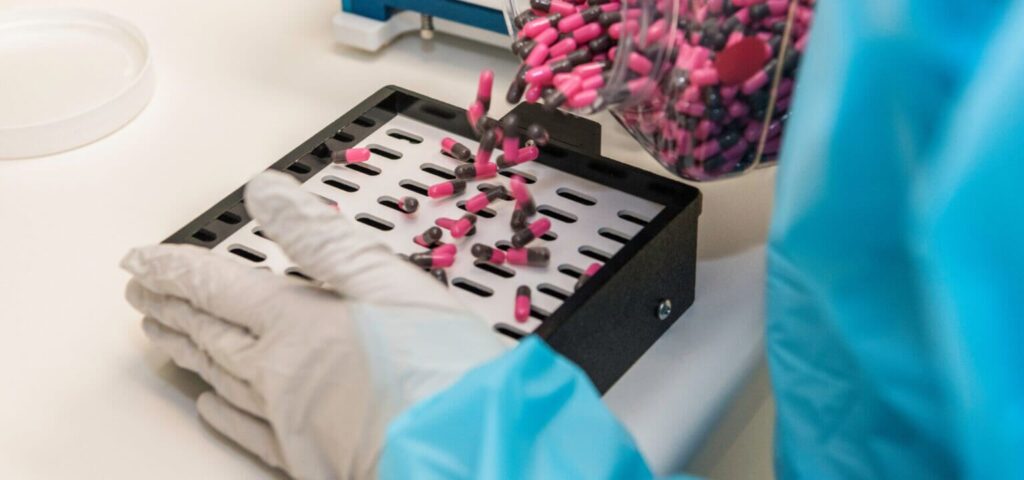In general, commercially available medication, whether in the form of a tablet, capsule, or liquid, is manufactured in bulk by pharmaceutical companies and distributed to pharmacies. These medications must adhere to strict regulations set by the government and undergo rigorous testing by the FDA to ensure their safety and effectiveness. However, there is an exemption to this rule – compounded medications.
Defining A Compounded Medication
Compounded medications are custom-made drugs that are prepared by pharmacists or physicians to meet the specific needs of a patient. These medicines typically consist of one or more active ingredients, which can be either commercially available or obtained from a reliable source, such as a reputable compounding pharmacy. The process of compounding involves mixing, combining, or altering ingredients to create an individualized medication that is not commercially available. To obtain a compounded medication, a prescription from a healthcare provider is required.
Types Of Compounded Prescriptions
Although every compounded prescription is unique, it can be roughly categorized into two main types: sterile and non-sterile compounds.
Sterile Compounds
Sterile compounded medications are prepared under strict aseptic conditions to ensure their safety for use in sensitive areas of the body, such as the eyes, blood vessels, and lungs. These types of compounds may be injectable solutions, ophthalmic (eye) drops, or inhalations, which are either administered by healthcare professionals at a hospital or clinic or self-administered by the patient at home.
Despite not being FDA-approved, sterile compounds are strictly regulated by state Boards of Pharmacy and must be carefully prepared and labeled to meet specific requirements.
Non-Sterile Compounds
Non-sterile compounded medications are prepared in a clean and controlled environment but not under strict sterile conditions. These types of compounds may take the form of creams, lotions, capsules, or oral liquids that are typically used for external application or oral ingestion.
Why Would Someone Need A Compounded Medication?
While commercially available medications are suitable for the majority of patients, there are instances where a compounded medication may be necessary. Some reasons for seeking a compounded medication include:
Unavailability Of Commercial Medications
Sometimes, the medication that a patient needs may not be available in a commercially manufactured form. For example, the medication may still be in development or have been discontinued due to lack of demand. In such cases, a compounding pharmacist can create the medication by using similar ingredients and dosage forms and customizing it to the patient’s needs.
Allergic Reactions To Commercial Medicine Ingredients
Some patients may be allergic to certain ingredients commonly used in commercially available medications. For example, a patient may be allergic to sesame oil, which is often used as a solvent for intramuscular injections (such as testosterone injections) to help the drug dissolve more easily. In such cases, a compounding pharmacist can find an alternative ingredient that the patient is not allergic to.
Tailored Dosages
Patients come in all shapes and sizes, and so do their medical needs. In some cases, commercially available medications may not be suitable for a particular patient due to factors such as age, weight, or severity of the condition. A compounding pharmacist can customize the dosage and strength of the medication according to the individual patient’s needs.
Shortages Or Discontinuations Of Medication
Generally speaking, it’s illegal to compound a medication that is commercially available. The only exception to this law is when a medication is on the FDA drug shortage list or has been discontinued for some reason. For example, if there are shortages or discontinuations of certain commercially available medications for various reasons, such as manufacturing issues, recalls, or supply chain disruptions, then a compounded medication with similar ingredients and dosage forms can be created.
Different Types Of Medications That Can Be Compounded
Many different types of medications can be compounded to meet the specific needs of a patient. Some common examples include:
- Pain management drugs, such as gabapentin, baclofen, cyclobenzaprine, diclofenac, ketamine, lidocaine, bupivacaine, and flurbiprofen
- Hormone replacement therapy drugs like progesterone, estradiol, estriol, and testosterone
- Dermatological medications for skin conditions like acne, rosacea, psoriasis, and eczema
- Pediatric medications in varying strengths and flavors to suit a child’s needs
- Dental preparations for treating issues like dry sockets or oral thrush
These are just a few examples of the many types of medications that can be compounded to meet a patient’s specific needs. A compounding pharmacist will work closely with the healthcare provider and patient to find the best solution for the patient’s individual needs.
Here at University Compounding Pharmacy (UCP), we have provided top-quality compounding services since 1999. Our primary focus is always on ensuring patient safety and delivering the best possible quality of care. We specialize in compounding medications for men’s health, women’s health, bio-identical hormones, and pet medications. Our team of experienced compounding pharmacists works closely with healthcare providers and patients to create customized medications that meet patients’ specific needs.
Who Can Compound Medications?
Only a licensed pharmacist, or a person under the supervision of a licensed pharmacist-in-charge, is allowed to compound medications. A compounding pharmacist must have specialized training and experience in sterile and non-sterile compounding techniques.
The process of compounding medications involves:
- Selecting the appropriate ingredients
- Choosing the correct dosage form
- Measuring and mixing the ingredients together
- Packaging the final product in an environment that meets the highest standards for safety and cleanliness
It is a complex process that requires precision and attention to detail to ensure the safety and effectiveness of the medication.
Although compounded medications are not subject to the same rigorous testing and regulations required by the FDA as commercially available medications, compounding pharmacies are still regulated by state Boards of Pharmacy and must comply with USP 795 and 797 guidelines for sterile and non-sterile compounding. This ensures that compounded medications are made in a safe, clean, and controlled environment to minimize the risk of contamination or errors.
At UCP, our team of highly trained pharmacists follows strict protocols and standards to ensure that our compounded medications are of the highest quality.
Laws And Policies About Compounding Drugs
Because the FDA does not review compounded medications for approval, there are some risks associated with compounded medications, such as the potential for contamination or improper dosage. Back in 2012, a multi-state outbreak of fungal meningitis was linked to contaminated compounded steroid injections. As a result, Congress passed the Compounding Quality Act (CQA) to enact stricter regulations for compounding pharmacies.
It’s important to note that the regulations outlined in the CQA, which include registration with the FDA and compliance with current Good Manufacturing Practices (cGMP), are only applicable to certain compounding pharmacies known as “outsourcing facilities” or 503B compounders. They do not apply to traditional compounding pharmacies like UCP, which are known as 503A compounders. However, all compounding pharmacies must comply with standards and guidelines established by the State Boards of Pharmacy and the United States Pharmacopeia (USP).
USP 795 covers non-sterile compounding, while USP 797 covers sterile compounding. These guidelines outline best practices for preparing and dispensing compounded medications to ensure patient safety and quality control. Additionally, every State Board of Pharmacy has requirements for proper labeling, record-keeping, and patient counseling. These laws vary from state to state and may also include restrictions on which drugs can be compounded.
At UCP, we fully comply with all state and federal regulations and USP standards to provide our patients with the safest and highest quality compounded medications. We regularly undergo inspections and follow strict protocols to maintain our high compliance standards.
Why Choose University Compounding Pharmacy?
At UCP, we take the responsibility of compounding medications very seriously. Patient safety and quality of care are at the forefront of everything we do. We understand that compounded medications can sometimes raise concerns due to the lack of FDA approval and the risk of contamination or improper dosages. We go above and beyond to ensure our patients receive safe and effective custom medications.
As a compounding pharmacy, we are committed to staying ahead of state and national regulations. The following are some of the steps we take to ensure our patients receive the highest quality compounded medications:
- We are PCAB certified: We have been accredited by the Pharmacy Compounding Accreditation Board (PCAB) since 2015. To obtain PCAB accreditation, a pharmacy must meet rigorous standards set by the PCAB, FDA, USP, and State Boards of Pharmacy. Regular testing and inspections ensure that we maintain the highest level of quality and safety in our compounded medications. It’s worth noting that only 1% of compounding pharmacies in the US are PCAB certified, making UCP a top choice for physicians and patients alike.
- We use ISO- & USP-compliant facilities and equipment: In the spring of 2017, we relocated to a spacious new facility equipped with cutting-edge laboratories for our sterile and non-sterile compounding preparations. This move was an essential part of expanding our capabilities and ensuring that we continue to meet the strict standards set by ISO and USP for quality control in compounding medications.
- We invest in continuous third-party testing: At UCP, we invest $30,000 in third-party testing every month to ensure that our compounded medications consistently meet and exceed all potency and sterility standards. While not required by law, we believe this level of dedication and commitment to quality is essential for the safety and satisfaction of our patients.
At UCP, we believe in transparency and patient education. That’s why we provide detailed information about our processes, ingredients, and potential risks associated with compounded medications. We want our patients to feel confident and informed when choosing us for their custom medication needs.
Explore The Benefits Of Customized Medications For Your Well-Being
Customized medications offer a range of benefits that can improve your overall health and well-being. Whether you require a specific dosage, have allergies to certain ingredients, or need medication in a different form, UCP is here to help.
Choosing a reputable compounding pharmacy like UCP can provide numerous benefits for your well-being. With our strict adherence to state and federal regulations, accreditation by PCAB, and continuous third-party testing, you can trust that our custom medications are safe and effective.
At UCP, we are dedicated to providing our patients with the highest quality compounded medications while prioritizing their safety and well-being. We continuously strive to exceed industry standards and maintain our reputation as one of the top compounding pharmacies in the country.
Choose University Compounding Pharmacy for quality and safe custom medications. Empower your health with knowledge!





